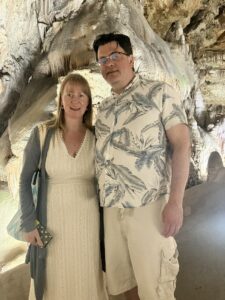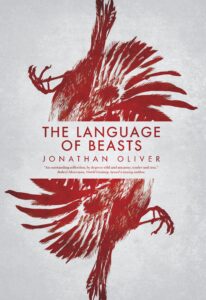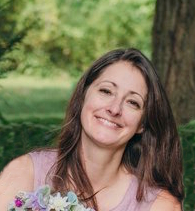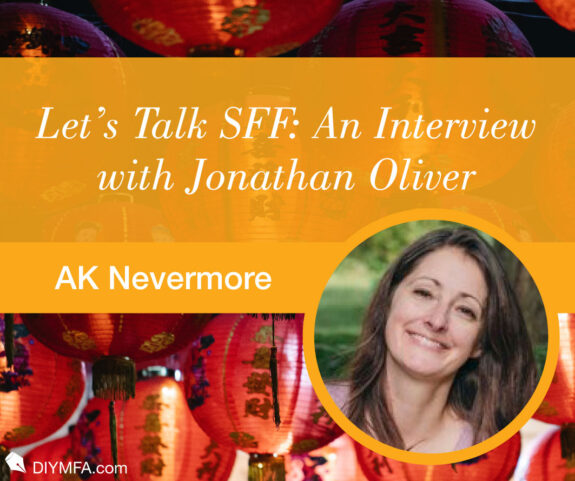Hey guys! It’s Alysen back with you, and boy, did you have a lot to say about my last article on Defining SFF. Overwhelmingly, the feedback was a massive group sigh of relief that you are not alone in that vague fog of what the heck. Well, unless you’re my mom. She prefers to be alone and just gave a half-a-shrug and a resounding “meh.” But she’s pretty much the human version of Grumpy Cat with a perm.
Yep. Just gonna leave that visual there.
Meanwhile, I had promised to give you a deep dive into the reasoning behind taking your time to understand where your work sits in that SFF morass. You remember, the whole, “it will help you land the agent that’s right for your book / tailoring your query letter / finding comp titles” spiel?
Mmm. Yeah, that one.
Well, you are in luck, people! Because not so long ago, I had the distinct pleasure of interviewing Jonathan Oliver, officially not that John Oliver since 1978, editor extraordinaire, and all-around awesome guy. He’s also the author of The Language of Beasts, a book every SFFH fan should have on their shelves.
I’ve worked with Jon for a couple of years now, and when DIY MFA asked me to do a column on SFF, I couldn’t think of a better resource. Full disclosure, my reasons were totally selfish. The man knows his stuff, and the insight he’s able to provide into the publishing world is gold. I hope you guys find a nugget or two in here for yourselves.
About Jonathan Oliver
Jonathan Oliver is an award-winning editor and writer. For almost thirteen years he was the Editor-in-Chief of Solaris and Abaddon Books, and also worked as a graphic novels editor for 2000 AD. After a short stint commissioning non-fiction, he decided to go freelance and now specializes in editing science fiction, fantasy, and horror for a variety of international clients.
He has worked with such authors as Audrey Niffenegger, Brandon Sanderson, Joe Abercrombie, and Yoon Ha Lee. Jonathan lives in the UK in Oxfordshire with his family and their cat, Minnie.
You can find him on his website or follow him on Twitter and Instagram.
About The Language of Beasts
Those dark, glistening jewels—stomach, kidneys, liver—whispered as they fell. I only caught a few words, but what they conveyed… well, it was profound.
In a slaughterhouse a group of men find they can tell fortunes from entrails; an invisible shark haunts a children’s book author; redemptive magic is discovered in the ancient chalk horse of the Oxfordshire hills; a woman vicar is possessed by the soul of a reactionary priest—in these seventeen stories of the weird, uncanny and fantastical, British Fantasy Award winner Jonathan Oliver takes the reader into imagined lives and worlds. Horrifying, weird and darkly humorous, The Language of Beasts is the first collection of stories from this critically acclaimed editor.
Pretty frickin’ cool, right?
I was seriously excited to pick his brain. I’ll spare you all the bits of banter where I jumped between topics like a squirrel in a trail mix factory and get right to the good stuff*…
AK Nevermore: Can you explain why comps are so important?
Jonathan Oliver: When you get your manuscript out on query, the comps are important because the agent, like the sales rep, wants a hook and a reason to read your book. If they just have a letter that sounds like generic fantasy, whatever. They see a hundred of those a day. It’s gonna be easy for them to pass.
Agents aren’t evil. They’re not like, looking for reasons to shoot your book down immediately. But because agents get so many submissions, they’re looking to see if there’s a quick reason for them not to pick up your manuscript. That’s easy for them. It’s the same as commissioning editors. As a commissioning editor, I would give it 50 pages to grab me, which is quite generous, I gather. People say you can tell from a first page, and sometimes you really can, but if a story hadn’t grabbed me within 50 pages, then usually it was a no from me.
They were exceptions to that. Sometimes I’d be engrossed in a novel three-quarters of it. And then the author would completely break the ending and you just spent four days reading the manuscript of your work time, and you thought, oh, got something here, and then the car went off the road in the direction you weren’t expecting. That can be very frustrating. So, yeah, when getting a query your comps are important, a short punchy synopsis is important, and clarity is important.
AK: I’ve also heard agents and publishers are looking for something that’s different, but the same.
JO: Yes, to a degree. I mean, I pushed against this a little bit. I did commission titles that occasionally go to a sales meeting and the US distributors, or even the UK Distributors occasionally said “What is this?” “Well, it’s like nothing you’ve ever seen before,” and they’re like, “Yeah, but we don’t want nothing we’ve ever seen before, we want Game of Thrones. Is it like Game of Thrones?”
You’d write these sales sheets, tip sheets, and you’d have to put marketing points on them. If you were doing Epic Fantasy, what they didn’t want to see was like, you know, “Deeply artistic expression of internal struggle,” or something. What they wanted to see was “Will appeal to fans of George RR Martin, is a bit like Game of Thrones,” because they can sell that easily.
What book reps are looking for when they’re looking to sell your title is that hook. So if you present them with something that’s a bit out there—which I sometimes did and I’ll stand by them, they’re still good books—it’s hard to give them a hook.
So, for example, one of my absolute favorite books I commissioned, and I can say this now that I’m not commissioning editor for Solaris anymore—so I can have favorites now—we published a book called Deadfall Hotel by Steve Rasnic Tem. He’s a World Fantasy Award-winning author. I’ve known his work since I started reading horror. So when Steve’s novel came to me through his agent, it was a name I recognized and I was like hell yes, I’ll read this.
It’s a haunted hotel novel, but it’s about family and it’s about relationships and it’s really beautiful. It’s got the air of Ray Bradbury or someone like that. It’s just gorgeous. And so when we were pitching to that, we wanted it to be unusual.
You can play that line as a commissioning editor, depending on how much power you have. And by power, I don’t mean like you’re being paid loads of money and you lord it, because Solaris was quite a small publisher. I was the Editor-in-Chief and there were only about five of us there and the owner of the company loved publishing and took a lot of commercial risks. They weren’t about to say, well these five books didn’t succeed, so let’s shut this down. It’s a passion project as well as a business. I was really lucky to have that.
But not every commissioner is going to have that especially at the very big houses. They are conservative and they don’t take risks. And yes, you’re going to get big advances for projects, but they tend to go to already tried and tested authors.
If they do go to new authors, if they spend serious money behind new authors and you see a lot of marketing, that book’s gonna have to earn out pretty quickly. A lot of titles just don’t earn out, and that’s where the mid-list publishing houses it’s not so much a problem, because the advances are more modest, the costs are more modest. But with someone like Penguin Random House, they spend 50,000 pounds, or whatever that is in dollars, on a new book and it doesn’t make that back within six months, that author’s probably gonna have to change their name or go elsewhere.
So commissioning editors at different houses have different restraints on them. I had a lot of freedom at Solaris. Whereas when I moved to nonfiction, two years of strange religious nonfiction, I had to sit through sales meetings and justify each book. That was difficult because they were always like, “Oh, what do you think it will sell in two years?” I’m like, “5,000 copies or so.” “Are you sure that’s going to sell that?” “No, this is a projection. There’s no guarantee here that how much it’s gonna sell or not.”
Commissioning editors at the big houses will have to convince all their departments, like the marketing department, finance, etc. They’ll have these big sales meetings where everybody has to agree to a title because they’ve all got to get behind it to make money. Whereas with smaller houses, it tends to be a bit more sort of, not off the cuff, but the decisions are slightly more intuitive and more creative and more sort of testing the boundaries. So that’s why, for me, you’ll see a lot more interesting fiction. The home of interesting SF and Fantasy is the mid-list and the independent publishers. No, there’s not a lot of money there, but there’s a lot of good books being produced.
Want more insight into the world of SFF publishing?
The above was edited to stay within article length restrictions, but if you want the full monty, you can check out the rest of my interview with Jon on my blog, where we talk more about his book, The Language of Beasts, his stint as a stand-up comedian, what commissioning editors are looking for, a host of SFFH authors and their work, various publishers and imprints, new trends in SFFH, how romance is influencing the genre, the rise of audio books, ebooks, the importance of being able to market yourself, literary fiction as a genre, pitching series, leaving readers on a cliffhanger, cadavers, and a boatload of other stuff.

AK Nevermore writes science fiction and urban fantasy with spice. She enjoys operating heavy machinery, freebases coffee, and gives up sarcasm for Lent every year. Unable to ignore the voices in her head, and unwilling to become medicated, she writes about dark worlds, perversely irreverent and profound, and always entertaining.
You can find her on her website or follow her on her sadly neglected Facebook, Twitter, and Instagram feeds.







